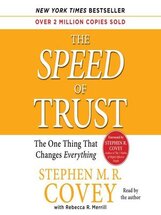 A long time ago, I read The 7 Habits of Highly Effective People by Stephen R. Covey. It's one of my favorite and one of the most impactful non-fiction books I have ever read. Someone recently recommended to me The Speed of Trust: The One Thing That Changes Everything by Stephen M.R. Covey, the son of the author of the first book, and I just finished reading it. The concept of trust is something I have been thinking about a lot (how it's earned, how quickly to grant it, etc.), so I enjoyed reading a full book about the topic. I found the book interesting and learned several things from it. I enjoyed the perspective of how the level of trust can either create dividends or taxes (in a relationship, organization, or society) and the breakdown of how trust is created (character and competence) and some of the sub-components and behaviors of each. I liked how it methodically broke things down. I don't think it was as impactful for me today as the first book was for me many years ago, but I still found it interesting and useful. Some of my takeaways and notes are below. 1
The one thing that changes everything Trust means confidence in others Trust affects speed and cost Build trust by keeping small commitments Do you trust your boss? Low trust tax High trust dividend 2 Trust is about character and competence 5 waves of trust Self trust: credibility Relationship trust: consistent behavior Organizational trust: alignment Market trust: reputation Societal trust: contribution 3 the first wave: self trust 4 cores of credibility Integrity Intent Credibility Results Following through on your own goals, morning alarms, New Year’s resolutions, etc. Make and keep commitments to self Little things count Speeduptrust.com questionnaire 2 cores about character, 2 about competence Core 1 integrity Congruence Walk your talk Make and keep commitments to yourself Stand for something Written mission statement Core 2 intent Motive Agenda Behavior Abundance thinking Core 3 capabilities What makes me credible Talents Attitudes Skills Knowledge Style Continuous learning throughout life Know where you’re going Core 4 results Track record matters Past performance Current performance Anticipated performance Take responsibility for results not activity Expect to win Beginners are many. Finishers are few. The second wave: relationship trust 13 behaviors Actions more meaningful than words Behavior 1: talk straight Don’t spin Be honest Use simple language Behavior 2: demonstrate respect Sharing Acknowledging lower ranks - waiter rule Behavior 3: create transparency Disclose conflicts Open book management of financials Behavior 4: right wrongs apologizing and making restitution Making someone whole Extra mile effort Don’t cover up mistakes Behavior 5: show loyalty Give credit to others Speak about others as if they were present Talk directly to the other person Behavior 6: deliver results Be on time Overdeliver Behavior 7: get better Learn new things If not falling, not pushing hard enough to improve Send continue/stop/start survey to your team Reframe mistake as feedback Behavior 8: confront reality Treat people like adults Behavior 9: clarify expectations Quantify everything Who what and by when Quality, speed, and cost Behavior 10: practice accountability Good leader takes their share of the blame and gives out more credit to others Behavior 11: listen first Behavior 12: keep commitments Keep them at work and at home Behavior 13: extend trust Third wave: organizational trust Alignment Taxes Redundancy Politics Disengagement Turnover Churn Fraud Dividends Value Loyalty Fourth wave: market trust Brand, reputation, feeling you have Trust monetized Fifth wave: societal trust Contribution to society Inspiring trust Extending smart trust Blind trust not the goal Low propensity to trust High analysis Level of trust vs. level of analysis Smart trust zone 2 best (high trust and high analysis) A propensity to trust
1 Comment
Abby
6/25/2023 11:05:45 pm
Adding this one to my list :) And I really love that you added your notes here! So helpful for a quick run through.
Reply
Your comment will be posted after it is approved.
Leave a Reply. |
Archives
June 2024
Categories
All
Subscribe |
 RSS Feed
RSS Feed
